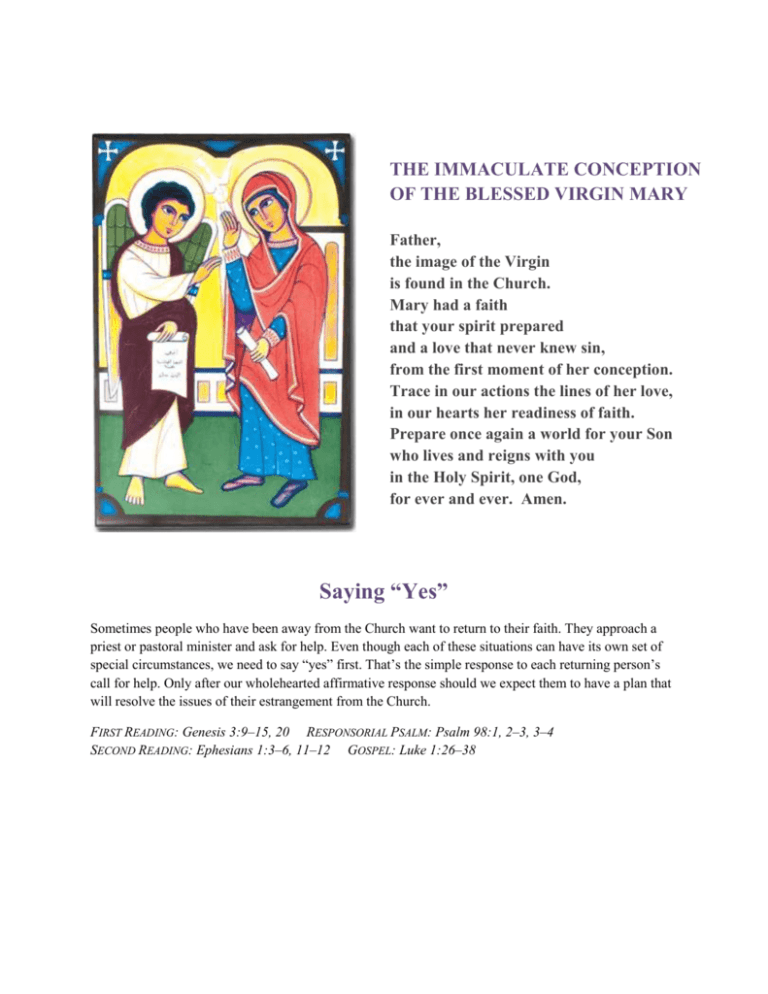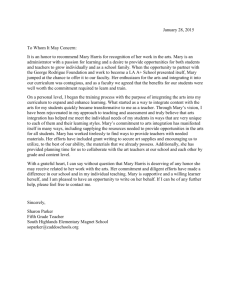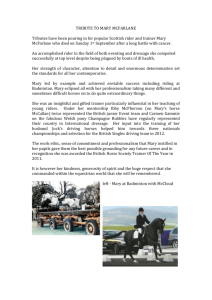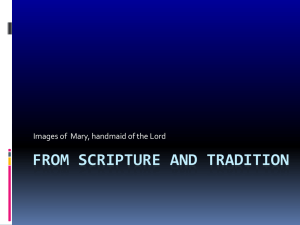
THE IMMACULATE CONCEPTION
OF THE BLESSED VIRGIN MARY
Father,
the image of the Virgin
is found in the Church.
Mary had a faith
that your spirit prepared
and a love that never knew sin,
from the first moment of her conception.
Trace in our actions the lines of her love,
in our hearts her readiness of faith.
Prepare once again a world for your Son
who lives and reigns with you
in the Holy Spirit, one God,
for ever and ever. Amen.
Saying “Yes”
Sometimes people who have been away from the Church want to return to their faith. They approach a
priest or pastoral minister and ask for help. Even though each of these situations can have its own set of
special circumstances, we need to say “yes” first. That’s the simple response to each returning person’s
call for help. Only after our wholehearted affirmative response should we expect them to have a plan that
will resolve the issues of their estrangement from the Church.
FIRST READING: Genesis 3:9–15, 20 RESPONSORIAL PSALM: Psalm 98:1, 2–3, 3–4
SECOND READING: Ephesians 1:3–6, 11–12 GOSPEL: Luke 1:26–38
Comment
From the time of Eve, it was not to be easy for women. The name Eve, translated from the Hebrew verb,
means “to live.” At first, Eve lived in a peaceful Eden with Adam, but because they disobeyed God,
Adam and Eve would live, but not in the same peace. Changes occurred. The serpent would forever crawl
on its belly, where Eve’s children could easily crush its head. Eve continued to live, becoming, in fact, the
mother of all the living people on earth. Even in their sinfulness, God intended for Adam and Eve to be
fruitful and for creation to continue.
In contrast to the sinfulness of Eve and her position of “mother of all the living,” today we honor Mary,
the Mother of God. The name Mary means “excellence,” and she is indeed the graced one whom Gabriel
addresses. Mary, of course, wonders how she could be graced before the Lord. Gabriel tells Mary that she
remains pure but has conceived a child through the intervention of the Holy Spirit. Maybe Mary
understood the implications of everything Gabriel said, and maybe she didn’t. But whatever the case,
without alarm or further questioning, Mary agreed to God’s plan and submitted herself as a servant of the
Lord.
Before she was formed, God chose Mary for this moment. Before she was conceived in her own mother’s
womb, God knew that Mary would be created without sin. God knew us, too, before we were created. In
Paul’s letter to the Ephesians, he reminds us that from the beginning, by means of a predetermined plan,
God claimed us as God’s own. Before we were formed in our mother’s womb, even before we knew
Christ, God planned for us. And for all this, the only thing God asks of us is that, like Mary, we simply
say, “Yes.”
Reflection
If we recognize no other endearing traits in Mary, we must recognize her willingness to say, “Yes.”
Scripture does not point out any difficulty Mary had in saying “yes,” but in our human understanding, we
may try to put ourselves in her position. At least for us, some of her “yesses” must have been pretty
tough.
Start with saying “yes” to Gabriel. Mary knew the laws of her time and no matter how good a man Joseph
himself was, she surely knew the situation had potential for difficulty.
And what about traveling on the back of a donkey all the way from Nazareth to Bethlehem? Add to that
hardship the realization that there was no place to bear her child except a stable. Still she did not
complain. If Mary wanted to go home, she never said a word about it when she learned they were going to
Egypt instead. Eventually she said the ultimate “yes.” Mary was asked to watch her son die painfully and
shamefully on a cross. She didn’t say anything, but she listened. She heard Jesus say that she was the
mother of all disciples. Mary is our mother, our model, our inspiration.
Copyright © 2002, World Library Publications. All rights reserved.
Discussion Questions
Our Gospel story today is a classic story of acceptance. Mary is facing an unbelievable challenge. She is
with child and that child is to be the Son of God. As much as she’d prefer that someone else bear that role,
she realizes that she has no alternative. So, she accepts the role of Mother of God with the beautiful
words, “I am the handmaid of the Lord, let it be done to me as you say.” Mary is our model and our
inspiration when we’re up against something we have to accept, something we have to face even though
we’d prefer an alternative.
1. The Blessed Mother accepted not only her role as the Mother of God, she accepted much that proved
difficult and challenging and hard. What do you feel are some of the strengths she possessed that enabled
her to do so?
2. What do you feel are the compelling reasons behind our unwillingness to accept choices when there are
no alternatives?
3. Old age and the death of a loved one are but two life examples choices with no real alternative. List
some other examples and explain why acceptance is important.









